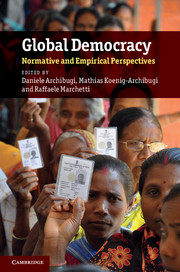Book contents
- Frontmatter
- Contents
- Figures
- Tables
- Notes on contributors
- Acknowledgements
- 1 Introduction
- 2 Models of global democracy
- 3 Citizens or stakeholders?
- 4 Is democratic legitimacy possible for international institutions?
- 5 Cosmopolitan democracy
- 6 Regional versus global democracy
- 7 Towards the metamorphosis of the United Nations
- 8 Flexible government for a globalized world
- 9 Global democracy and domestic analogies
- 10 Global democracy for a partially joined-up world
- 11 Civil society and global democracy
- 12 Global capitalism and global democracy
- 13 From peace between democracies to global democracy
- 14 The promise and perils of global democracy
- Index
- References
11 - Civil society and global democracy
An assessment
Published online by Cambridge University Press: 05 June 2012
- Frontmatter
- Contents
- Figures
- Tables
- Notes on contributors
- Acknowledgements
- 1 Introduction
- 2 Models of global democracy
- 3 Citizens or stakeholders?
- 4 Is democratic legitimacy possible for international institutions?
- 5 Cosmopolitan democracy
- 6 Regional versus global democracy
- 7 Towards the metamorphosis of the United Nations
- 8 Flexible government for a globalized world
- 9 Global democracy and domestic analogies
- 10 Global democracy for a partially joined-up world
- 11 Civil society and global democracy
- 12 Global capitalism and global democracy
- 13 From peace between democracies to global democracy
- 14 The promise and perils of global democracy
- Index
- References
Summary
Introduction
Civil society actors are increasingly seen as holding the promise of a democratization of global governance. Rejecting confederal and federal blueprints for global democracy, such as the federal model defended by Marchetti (this volume), a number of theorists in recent years have advanced models for how to democratize existing institutional arrangements through the involvement of civil society actors. Terry Macdonald (2008) argues that ‘we should embrace the prospect of a “pluralist” liberal democratic order in global politics, composed of multiple agents of public power held to account by their overlapping “stakeholder” communities’ (13) (see also T. Macdonald and K. Macdonald, both this volume). In the same vein, Jan Aart Scholte (2005) submits that ‘civil society associations . . . offer significant possibilities to increase democratic accountability in global regulatory arrangements’ (88–9), while Jens Steffek and Patrizia Nanz (2008) suggest that ‘organized civil society . . . has the potential to function as a “transmission belt” between a global citizenry and the institutions of global governance’ (3). Other authors, such as Thomas Christiano (this volume), are more sceptical about the ability of non-governmental organizations (NGOs) to perform this role at the international level.
In this chapter, we assess the empirical viability of this normative vision, variously referred to as ‘global stakeholder democracy’, ‘transnational democracy’ and ‘democratic polycentrism’ (see Archibugi et al., this volume). This chapter thereby seeks to advance a new agenda on research in global democracy, informed by the ambition to explore the empirical preconditions of alternative theoretical models. We share this ambition with recent contributions that evaluate the extent to which the conditions that once facilitated democratization at the domestic level also are present at the global level (Goodin 2010, Koenig-Archibugi 2010 and this volume). Yet we choose to proceed in an alternative way, focusing instead on existing patterns of participation and accountability, and their implications for the normative vision of democratic polycentrism. This is a normative vision that features relatively short-term and specific proposals for how to democratize global governance, and therefore is suitable for the kind of empirical assessment we undertake (cf. Macdonald and Marchetti 2010, 14). Drawing on primary empirical observations and secondary sources, we map the actual patterns of civil society involvement in global governance. This chapter follows up on an earlier article, outlining in principal terms the promises and pitfalls of transnational actors in the democratization of global governance (Bexell et al. 2010).
- Type
- Chapter
- Information
- Global DemocracyNormative and Empirical Perspectives, pp. 210 - 232Publisher: Cambridge University PressPrint publication year: 2011
References
- 18
- Cited by



